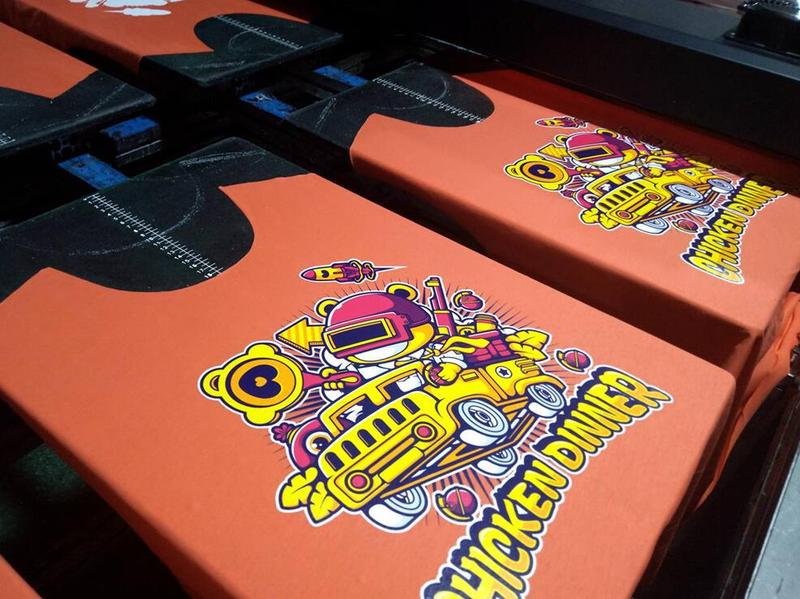When it comes to choosing the best fabric for t-shirts, the options can be overwhelming. From cotton to polyester, each fabric has its own unique qualities. Understanding these characteristics can help you select the material that best suits your needs.
As a professional t-shirt manufacturer, I’ll guide you through how to choose the right fabric for different types of t-shirts based on our production experience.
Key Factors to Consider When Choosing T-Shirt Fabrics
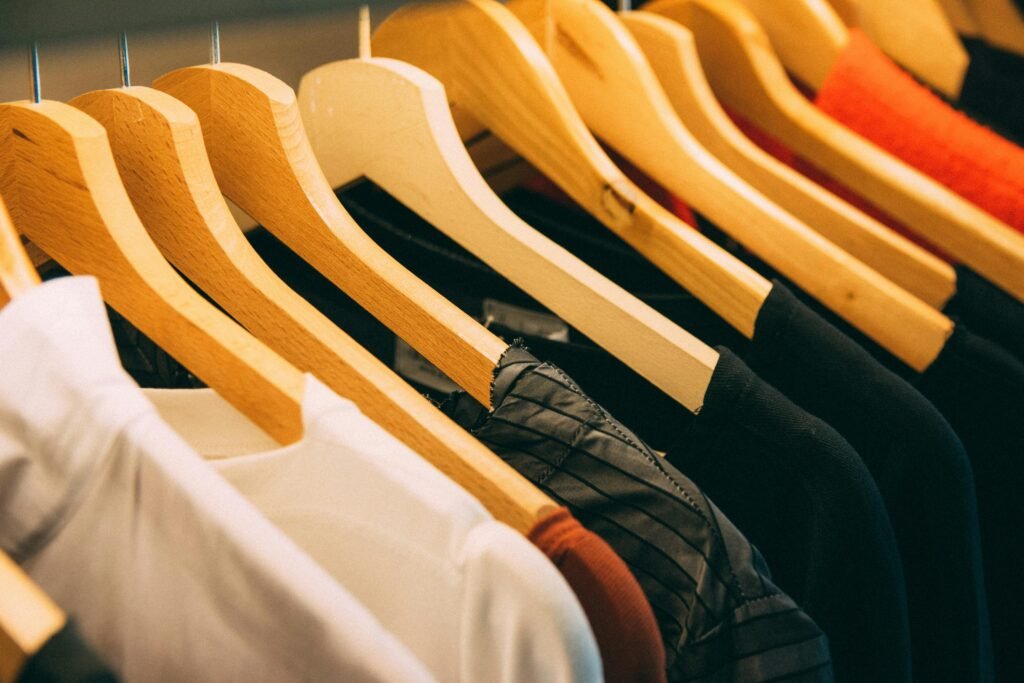
First, consider the following key factors when selecting t-shirt fabrics:
Comfort: The fabric should feel good against the skin, providing a pleasant wearing experience all day.
Durability: For brands focused on quality, durability ensures the t-shirt can withstand repeated wear and washing without losing its shape, color, or integrity.
Breathability: Breathable fabrics keep the wearer cool and comfortable, which is important for athletic t-shirts.
Stretch and Flexibility: For sportswear or fitted styles, adding elastic fibers or using fabrics with natural stretch can provide better flexibility.
Cost and Availability: Selecting the most cost-effective fabrics for T-shirts with different functions helps in making the best product within budgetary constraints.
Environmental Impact: With growing awareness of environmental sustainability, choosing eco-friendly fabrics like organic cotton, bamboo, and recycled polyester can minimize environmental impact and enhance brand appeal.
Other Fabric Factors to Consider
Fabric Weight
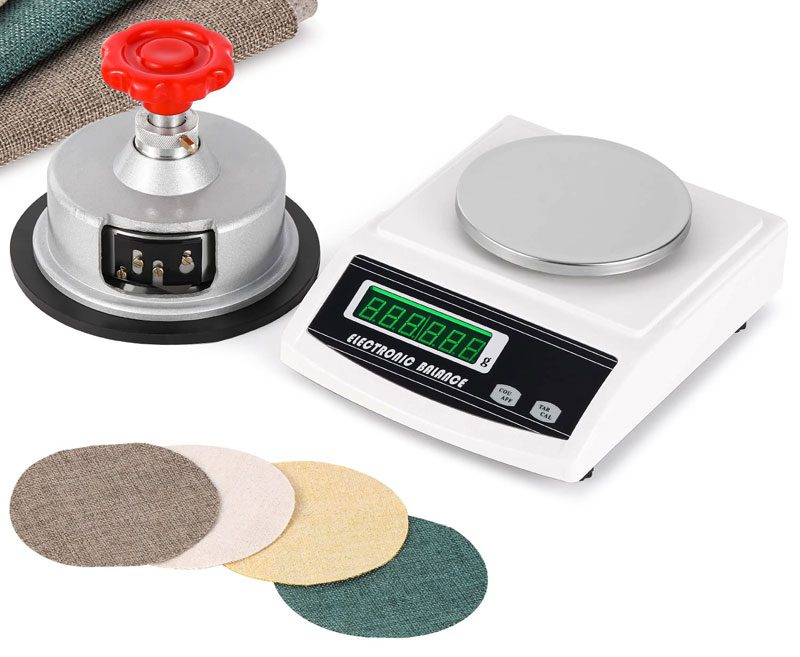
Fabric weight is a measure of how heavy or light a fabric is, usually expressed in grams per square meter (gsm) or ounces per square yard (oz/yd²). It indicates the thickness and density of the fabric, which can influence its suitability for different types of garments and its overall feel and durability.
Lightweight Fabrics (less than 150 gsm)
Soft, breathable, and comfortable. Ideal for warmer climates or active wear.
Medium-Weight Fabrics (150 to 350 gsm)
Suitable for everyday wear, versatile for different climates and activities.
Heavyweight Fabrics (350 gsm or more)
Thicker, more durable, and warm. Suitable for work t-shirts, winter wear, or high-end fashion t-shirts.
Yarn Count

The yarn count measures the thickness of the yarn. In the textile industry, a higher yarn count means finer, lighter, and softer fabric, while a lower yarn count means thicker, coarser, and sturdier fabric.
High Yarn Count (above 40s): Soft and smooth, with a finer, tighter weave for a smoother fabric surface. Ideal for luxury t-shirts and high-quality casual wear.
Low Yarn Count (less than 20s): Coarser and sometimes heavier, suitable for basic everyday t-shirts and durable workwear.
Common T-Shirt Fabrics
Cotton
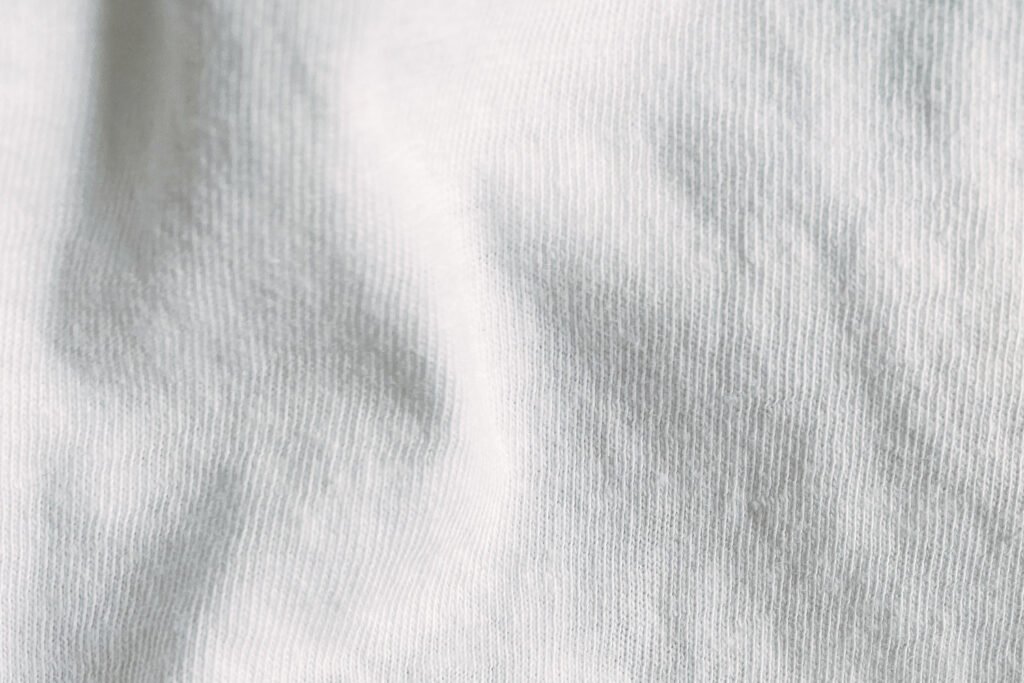
Cotton is widely regarded as the best fabric for everyday t-shirts due to its softness, breathability, and excellent moisture absorption. It is a popular natural fiber that has been a staple in textile manufacturing for centuries.
Characteristics: Breathable, absorbent, hypoallergenic, eco-friendly.
Cotton fabric is also the best choice for print-on-demand t-shirts because the ink integrates well into the fibers, providing a good canvas for high-resolution designs.
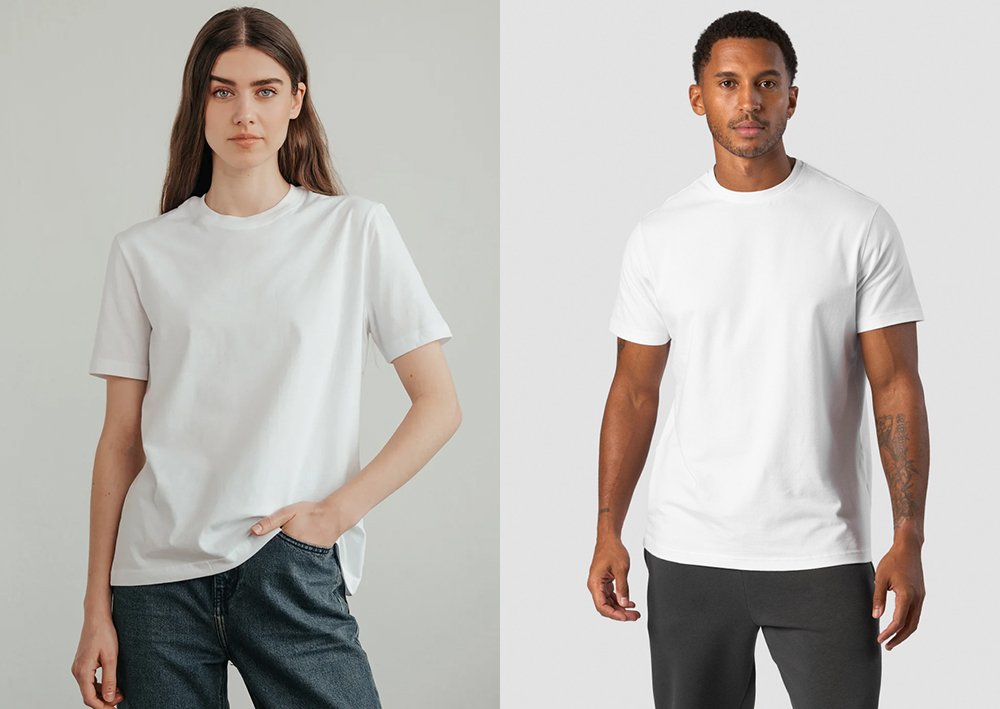
Types of Cotton
Combed Cotton: This type of cotton is combed to remove short fibers and impurities, resulting in a smoother, softer, and more durable fabric.
Organic Cotton: Grown without synthetic pesticides or fertilizers, organic cotton is eco-friendly and usually softer, with less irritation to the skin.
Pima Cotton: Pima cotton is a long-staple cotton primarily grown in the USA, Peru, and Australia. It has longer, finer fibers, resulting in better quality.
Supima Cotton: Supima is a trademarked premium cotton that is softer, more durable, and has a luxurious feel compared to regular Pima cotton.
Pros and Cons of Cotton
Pros: The advantages of cotton are obvious. It’s comfortable, breathable, and soft, making it perfect for all-day wear. Cotton also adapts well to various designs and styles.
Cons: Cotton can shrink if not pre-shrunk, and it wrinkles easily. Compared to synthetic fibers, it is less durable and can wear out faster with frequent washing.
Polyester

Polyester is a synthetic fiber made from petroleum products. It is one of the most popular and widely used fabrics in the world, known for its durability, resistance to shrinking and stretching, and quick-drying properties.
Characteristics: Durability, wrinkle resistance, moisture-wicking, quick-drying, easy to care for.
Polyester is widely used in the production of t-shirts, either as a standalone fabric or blended with other materials like cotton.

Pros
Polyester t-shirts are extremely durable, and wrinkle-resistant and retain their vibrant colors even after multiple washes.
Their moisture-wicking and quick-drying properties make them ideal for sportswear and athletic apparel, ensuring comfort during physical activity.
In addition, polyester fabrics are lightweight and affordable, offering a cost-effective option without sacrificing quality.
Cons
However, polyester fibers are less breathable than natural fibers like cotton and can cause discomfort in hot weather.
Polyester fibers tend to retain odors and accumulate static electricity, making the fabric cling to the body.
In addition, the production of polyester fibers has a significant environmental impact because it is derived from petroleum and is not readily biodegradable.
Cotton-Polyester Blends

Cotton-polyester blend fabrics combine the advantages of both cotton and polyester fibers, making them a popular choice for t-shirt fabrics. This fabric offers the comfort and breathability of cotton with the durability and wrinkle resistance of polyester, which is suitable for various occasions.
Characteristics: These blends provide a balanced combination of softness, breathability, and durability.
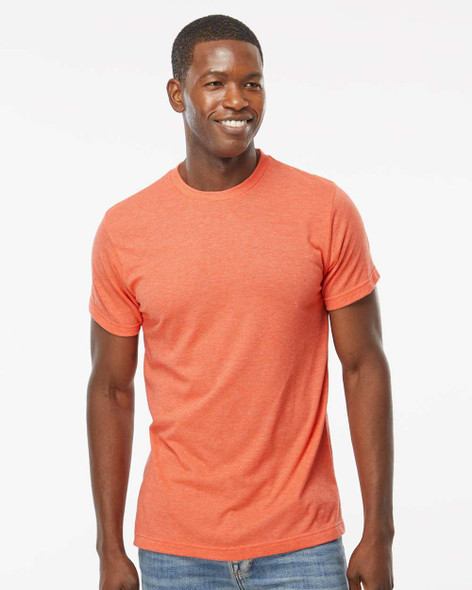
These blends typically consist of a specific ratio of cotton to polyester, here are some popular ratios:
50% Cotton / 50% Polyester: Everyday casual t-shirts. This ratio balances cotton’s comfort with polyester’s durability, suitable for regular life and light sports.
60% Cotton / 40% Polyester: Ideal for sports t-shirts. A slightly higher cotton content provides better comfort and breathability, while the polyester enhances durability and moisture-wicking.
65% Cotton / 35% Polyester: More comfortable and softer fabric. Suitable for business casual t-shirts, with polyester providing wrinkle resistance and good shape retention.
80% Cotton / 20% Polyester: Commonly used for high-end casual t-shirts.
Pros
Cotton-polyester blends combine the best attributes of both fibers: comfort, durability, and easy maintenance. They are less prone to shrinking and wrinkling, making them suitable for various applications.
Cons
Blended fabrics may not be as breathable as pure cotton and can sometimes feel less soft. Over time, they may also pill, especially in lower-quality blends.
Rayon
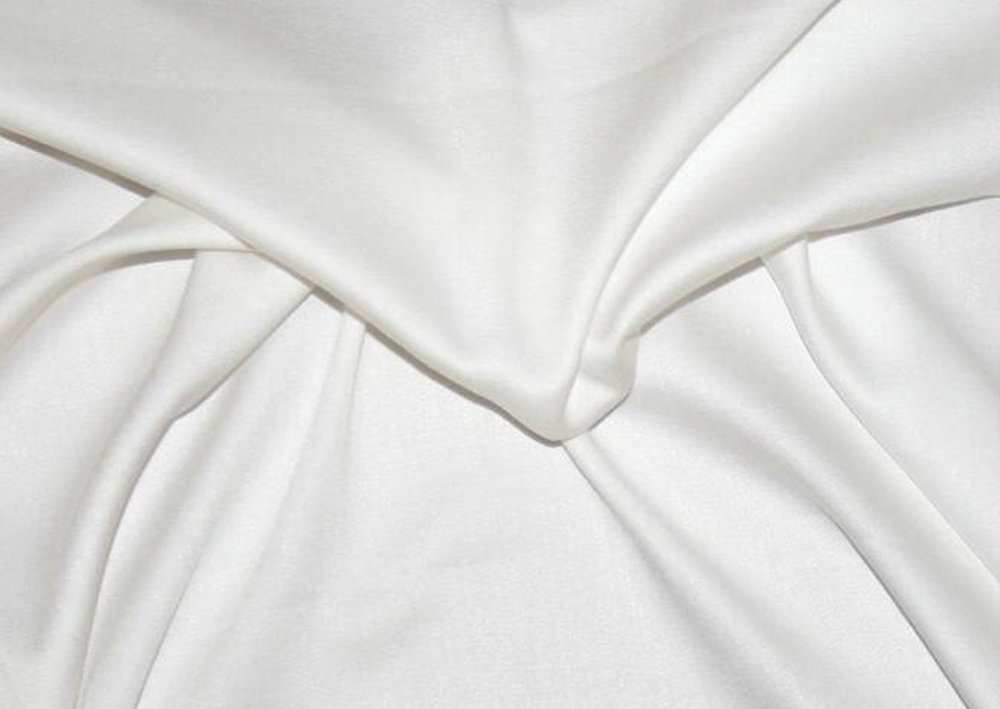
Rayon is a semi-synthetic fiber made from regenerated cellulose, derived from natural sources such as wood pulp, cotton lint, or bamboo. It was originally developed in the late 19th century as an alternative to silk, offering similar properties at a more affordable price.
Types
Viscose: It is produced by converting the cellulose from wood pulp or cotton lint into a viscous solution, and then spinning it into fibers. Viscose is smooth, soft, and has a silk-like drape. It is highly absorbent and breathable, providing a luxurious feel. However, it wrinkles easily and may shrink if not cared for properly.
Modal: Modal is a more refined form of rayon, also made from regenerated cellulose, usually derived from beech trees. The production process is similar to viscose but often involves additional steps to improve fiber performance. Modal is known for its exceptional softness, strength, and color retention compared to standard viscose. It is more resistant to shrinkage and wrinkling and maintains its shape better, making it a popular choice for high-quality garments.
Modal fabrics are usually more expensive than viscose fabrics due to their more complex production process.

Pro
Rayon T-shirts offer several advantages, including a silky texture and high breathability, making them comfortable to wear. The fabric drapes well, giving T-shirts a flattering fit, and its ability to dye easily results in vibrant colors. Rayon is also lightweight, adding to the overall comfort and appeal.
Cons
However, rayon t-shirts wrinkle easily and may shrink when washed. This fabric is fragile and prone to wear and tear and needs to be handled with care. In addition, the production of rayon involves a chemical process that may be harmful to the environment if not properly managed.
Linen
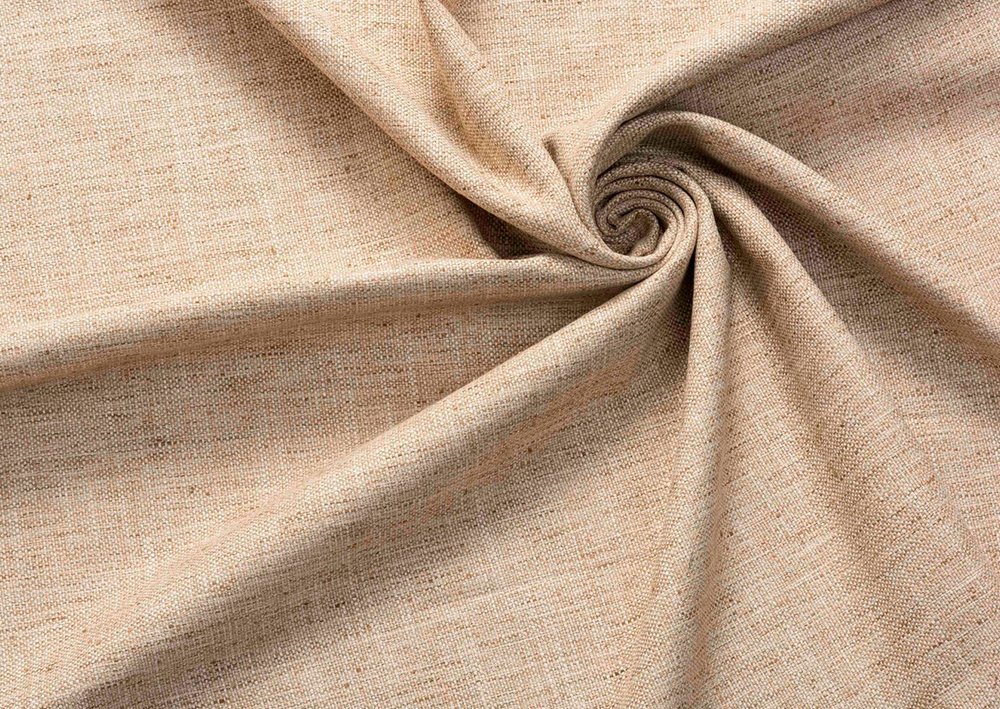
Linen is a natural fiber derived from the flax plant, valued for its breathability and eco-friendly properties, making it a popular choice for summer wear and casual fashion clothing.
Characteristics: Linen fabrics are lightweight, breathable, durable, and naturally eco-friendly. They have a unique texture and are commonly used in casual and summer clothing.
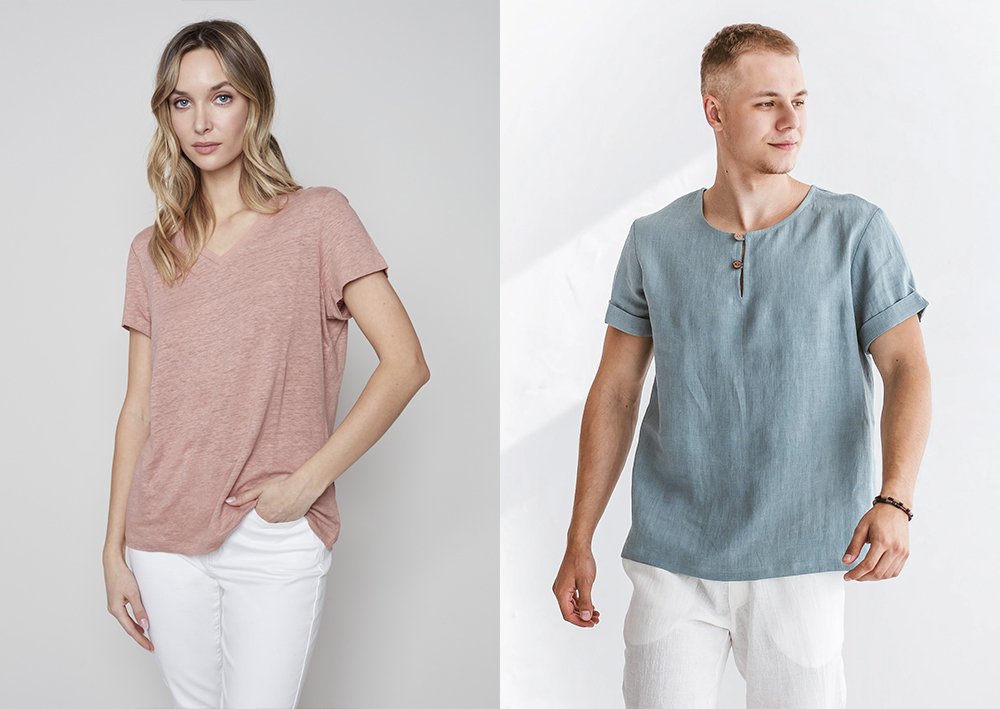
Pro
Linen T-shirts have excellent breathability and moisture-wicking properties, making them ideal for warm weather. The fabric is extremely durable, getting softer with every wash and offering a natural, textured look that is stylish and timeless.
Cons
However, linen T-shirts have some disadvantages. They tend to wrinkle easily, requiring frequent ironing to maintain a neat appearance. The fabric can also feel rough initially, needing multiple washes to achieve softness. Additionally, linen is less stretchy than other fabrics, which may affect the fit and comfort of some wearers.
Bamboo
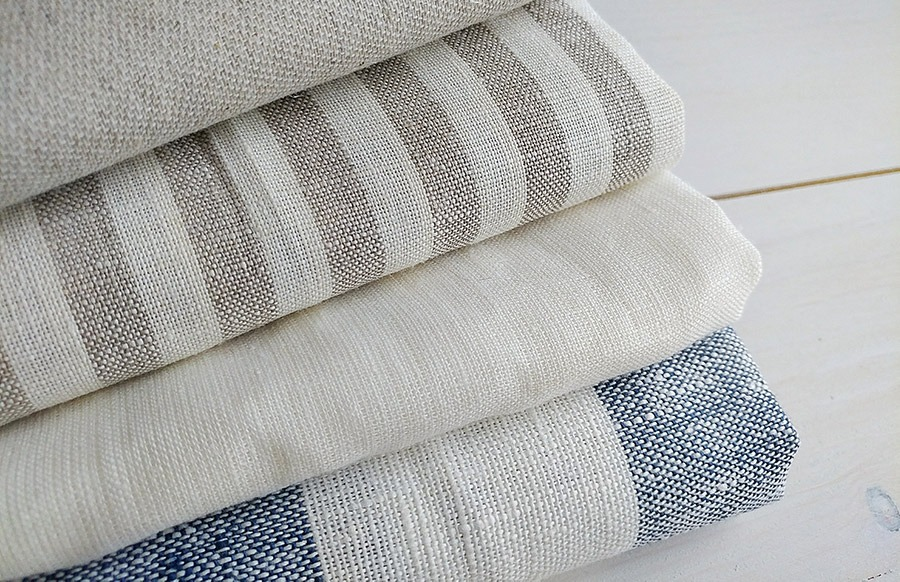
Bamboo fabric is a textile made from the cellulose extracted from bamboo plants. It is recognized for its eco-friendly properties and unique characteristics, making it an attractive choice for various clothing and textile products.
Characteristics: Bamboo fibers are soft, breathable, and moisture-wicking. They also possess natural antibacterial properties

Pro
Bamboo fabrics have excellent softness and breathability, making them perfect for everyday wear. The fabric is also naturally hypoallergenic and has antimicrobial properties that help reduce odors. In addition, bamboo is a sustainable resource that requires less water and pesticides than traditional crops such as cotton.
Cons
On the downside, bamboo fiber T-shirts can be more expensive due to the more complicated processing required to turn bamboo into fabric. Bamboo fiber T-shirts are also less durable than other fabrics such as cotton or polyester, are more prone to wrinkling, and tend to pill or warp over time.
Tri-Blends
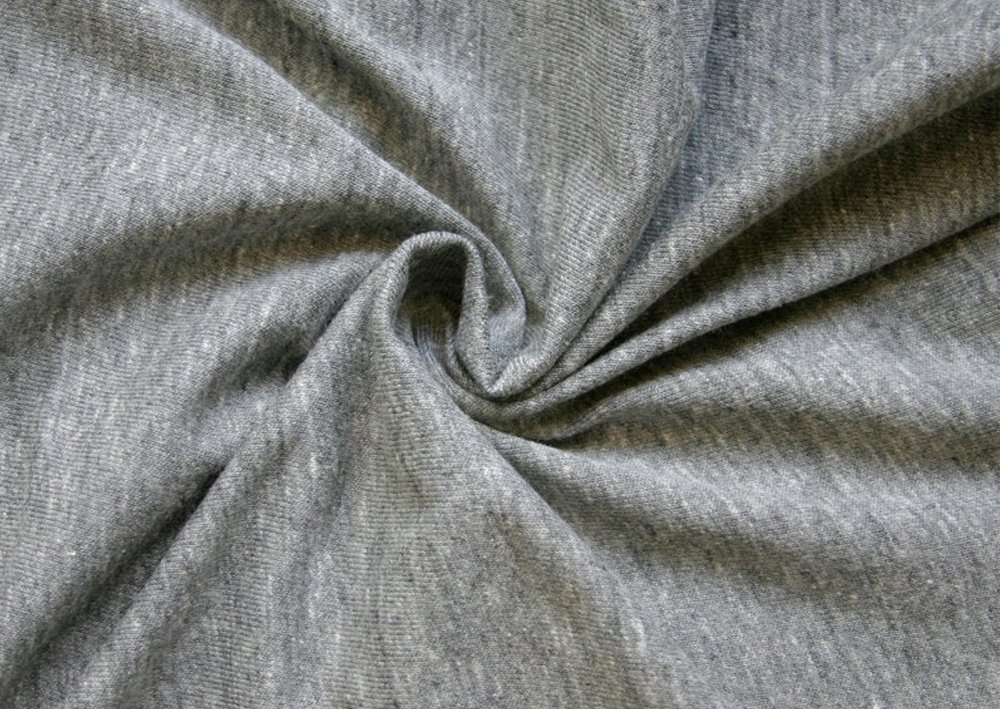
Tri-blend fabrics are usually made from a mix of cotton, polyester, and rayon, taking advantage of the best qualities of each fiber to create a soft, durable, and comfortable fabric, ideal for making various types of t-shirts.
Features: These fabrics are soft, durable, and lightweight, with a slight stretch. They offer a vintage, heathered look.
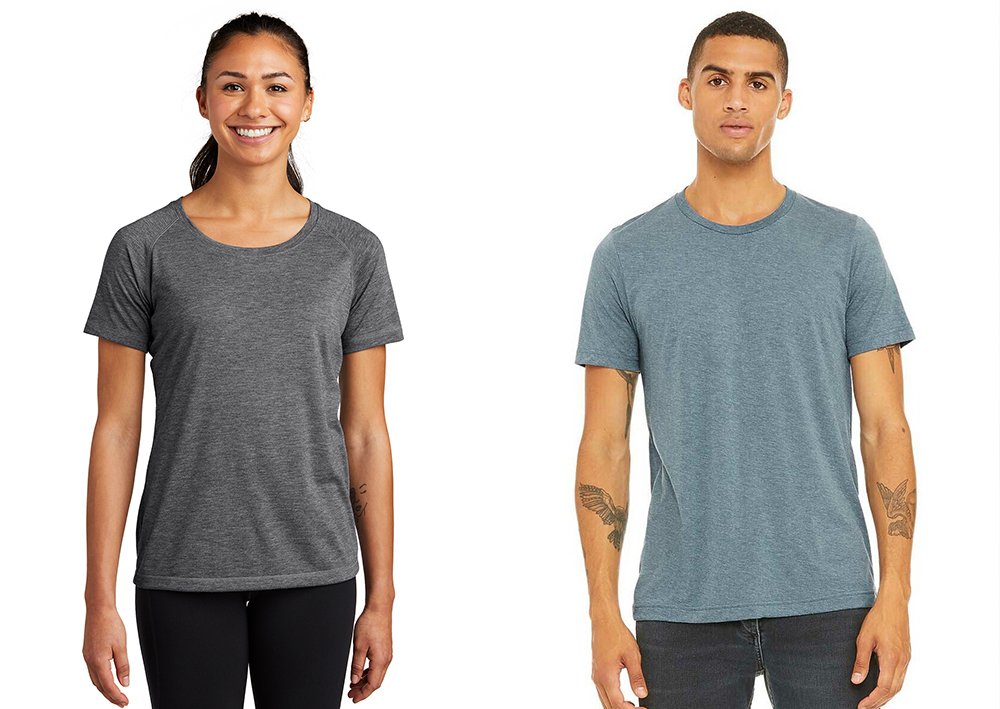
Pro
Tri-blend T-shirts combine cotton, polyester, and rayon, offering a balance of softness, durability, and stretch. They are incredibly comfortable and have a stylish, vintage look. The blend also provides moisture-wicking properties, making them suitable for various activities and climates while maintaining shape and color over time.
Cons
However, Tri-blend T-shirts can be more expensive due to the mixed materials and manufacturing process. They may not be as eco-friendly as pure cotton options, as the polyester component is derived from plastic. Additionally, the blend might not be ideal for those seeking purely natural fibers or experiencing sensitivities to synthetic materials.
Comparing Fabrics for Different Uses
Casual Wear
Best Fabric for Everyday Comfort: For casual, everyday wear, cotton, and cotton-blend fabrics are ideal due to their softness, breathability, and comfort. These fabrics provide a pleasant wearing experience for various activities
Activewear
Best Performance Fabrics: Polyester and high-performance blends are the top choices for activewear. Their moisture-wicking properties, durability, and quick-drying ability make them well-suited for an active lifestyle, keeping the wearer dry and comfortable during physical activities.
Sustainable Choices
Best Eco-Friendly Fabrics: Organic cotton, bamboo, and linen are excellent choices for environmentally-conscious brands and buyers. These fabrics offer sustainable alternatives, reducing environmental impact while maintaining quality and performance.
Conclusion
Choosing the right fabric for t-shirts can achieve a perfect balance of comfort, durability, and style. By understanding the characteristics of different fabrics and considering specific needs, you can select the best fabric that aligns with your brand goals and customer preferences, ensuring the production of high-quality, standout t-shirts.


